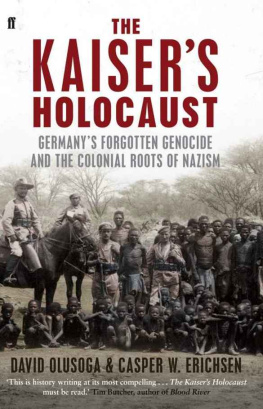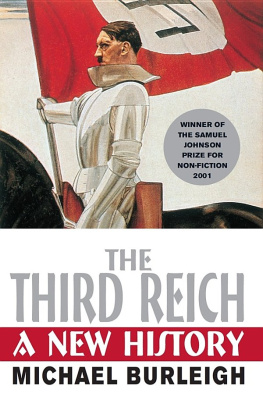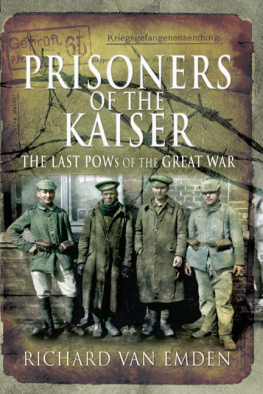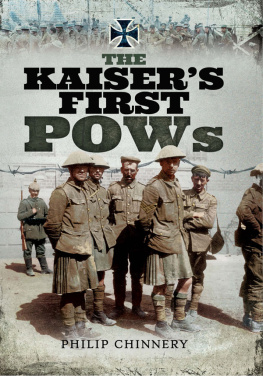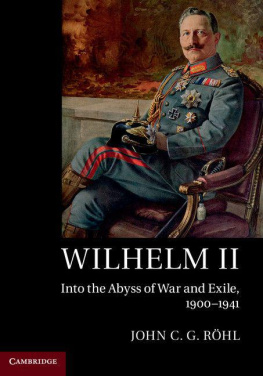INTRODUCTION
Cell 5

At 10.30 p.m. on 14 October 1946, Private Harold F. Johnson of C Company, 26th US Infantry, walked along the corridor leading to Cell 5. Taking up the position he was to occupy for the next few hours, he leaned forward and peered through the viewing hole into the cell. At that time, Johnson later informed a Board of Inquiry, the prisoner was lying flat on his back with his hands stretched out along his sides above the blankets. He stayed in that position for about five minutes without so much as moving. At about 10.40, Johnson informs us, the captive man brought his hands across his chest with his fingers laced and turned his head to the wall He lay there for about two or three minutes Later he seemed to stiffen and made a blowing, choking sound through his lips. Private Johnson raised the alarm. He shouted for the Corporal of the Relief, Lieutenant Cromer, who ran noisily down the spiral staircase from the corridor above, quickly followed by the Prison Chaplain, Captain Henry F. Gerecke. Only when all three were assembled did Johnson unlock and swing open the cell door. Cromer rushed past and was the first inside, followed by the Chaplain;
The prisoner who lay in Cell 5 of the Nuremberg Prison, with shards of glass from an ampoule of cyanide still in his mouth, had once been Prime Minister of Prussia and President of the Reichstag. He was the former Commander-in-Chief of the most feared air force in Europe and a ruthless administrator who had overseen the deadly exploitation of Eastern Europe. He considered himself as he had boasted to his jailers only weeks earlier a historical figure, and was convinced that in fifty or sixty years statues in his image would be erected all across Germany. He was Hermann Gring, and in the last twist of his strange life he had cheated the hangman, committing suicide just two hours before his execution.

Seven months earlier, in one of the opening addresses of the Trial of German Major War Criminals, one of the American prosecutors, Robert Kemper, had described the Nuremberg Trials as the greatest history seminar ever. The case for the prosecution was in itself a monumental piece of historical research. Outside the chamber, a team of historians, translators, archivists and documentary filmmakers had assembled to catalogue and file, estimate and quantify the litany of aggression and murderous criminality committed during the twelve years of Hitlers Thousand-Year Reich. From millions of individual tragedies, they had formed a prosecution case. The documents linking these crimes to the twenty-three accused men had been duplicated, indexed and translated into French, Russian and English. The indictment alone ran to twenty-four thousand words. The preparation of the case for the prosecution could perhaps have lasted longer than Nazi rule itself. As it was, the first three days of the trial were entirely taken up just reading the indictment into the official record.
Over the course of the trial, the defendants were condemned by the records from their pasts. Their own signatures, on their own documents, were submitted against them. The minutes of incriminating meetings they had attended were recited to them; their speeches and edicts read, sometimes shouted, back at them. Those who had escaped their prisons and concentration camps recounted their appalling stories. Perhaps at no other time and in no other place has the work of historians and archivists been put to such dramatic effect. In our time, only the Truth and Reconciliation Committees of post-Apartheid South Africa have come close to replicating the drama of Nuremberg.
What happened at Nuremberg between November 1945 and October 1946 was more than a trial: it was the elaborate centrepiece of an enormous act of national exorcism. The Allied powers believed that the prosecution of the surviving members of the Nazi elite would be a key step in the de-Nazification of the German people. The post-war settlement was, in part, predicated upon the willingness of Germanys battered and exhausted population to reject Nazism. With every major city in ruins, five million Germans dead and four armies of occupation on German soil, all but the most fanatically pro-Nazi were willing to acknowledge that the Third Reich had been an unparalleled national calamity. When confronted at Nuremberg with the stark truth of what Germany had done under the Nazis, some came to other conclusions. The Nazi leaders in the dock, and the thousands of henchmen who had enacted their decrees, came to be seen as other. Their actions had showed them to be inhumane; perhaps, therefore, they were unhuman. Led by such men, the Third Reich had been capable of crimes that were both terrible and unique in history. Nazism, so the argument went, had been an aberration in European history, a discontinuity.
This is the great post-war myth: the comforting fantasy that the Nazis were a new order of monsters and that their crimes were without precursor or precedent. They were not. Much of Nazi ideology and many of the crimes committed in its name were part of a longer trend within European history. Nazism was both a culmination and a distortion of decades of German and European history and philosophy. It was, in part, the final homecoming of theories and practices that Europeans had developed and perfected in far-flung corners of the world during the last phase of imperial conquest. There is nothing within that historical subsoil that made the ultimate flowering of Nazism inevitable, but there is much that makes it understandable. At Nuremberg, however, all such historical precedent was plunged into darkness. The greatest history seminar ever did not look back far enough into history.

The Nuremberg Trials took as their start date the year in which a new age of barbarism had seemed to overwhelm Europe 1914. This was year zero for the prosecuting nations, all of whom agreed that World War I had been the calamity that set Europe on course for the greater tragedies of World War II. The generation who had mutilated their own continent had, in the process, been disfigured politically and ideologically. The national enmities and the trauma of mass, mechanised killing had sown the seeds for the savagery that lay at the heart of Nazism. At Nuremberg, everything before the Somme, Verdun and Ypres was regarded as mere detail, as it was presumed that Nazism as an ideology had emerged fully formed from the chaos and resentment following Germanys defeat in 1918.
In its narrow historical focus, if in no other way, the trial of Hermann Gring was typical. When questioning began, on the morning of 13 March, Gring was asked for a short account of his life up to the outbreak of the First World War. The president of the court repeatedly stressed the need for brevity. It was only when Grings account reached 1914 that he was encouraged to elaborate and detailed questioning began. Over the course of the 218-day trial, Hermann Gring, the lead defendant, delivered only four sentences about his life before World War I and the role of his family in Germanys longer history.

